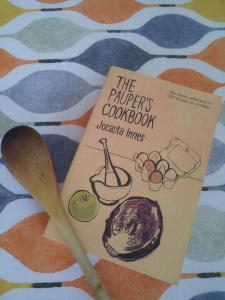
I happened to be sent a copy of ‘The Pauper’s Cookbook’ by Jocasta Innes. I haven’t actually got as far as trying any of the recipes as I have got side-tracking by the surprisingly thoughtful introduction, which discusses the ebb and flow of enthusiasm for food without excess expenses.
With the recession now over, perhaps the moment for reflection on how best to describe everyday living with financial constraint has passed, but I don’t think anyone believes we will return to giddy, guilt-free spending anytime soon.
Innes begins by explaining her rationale for the choice of the word ‘pauper’.
‘[My editor] was dubious about my choice of title, unconvinced that potential readers would recognize or approve of its tongue-in-cheekiness. I argued that it was catchy, got the message across succinctly, without the dismal connotations of words like ‘budget’ or ‘economy’. Besides, I argued that pauperishness was not the shameful state it once had been; sixties hippies had made poverty into something of a mantra, an anti-materialistic stance.’
Later, Innes, describes why later the title and concept no longer worked. ‘The high-rolling eighties supervened, the pauper tag felt a bit tacky to a generation revelling in conspicuous consumption, big cars, big hair, big shoulders, and extravagant restaurant meals.’
However, the book was subsequently re-issued.
‘I needed no persuasion to revive ‘The Pauper’s Cookbook’ concept, in the early nineties, when there was more than a whiff of recession in the air…’ This edition proved to be less successful. ‘Still basking in the afterglow of the eighties, I think people were unwilling to admit they were experiencing more than a temporary downturn; to be hard-up, never mind a pauper, was not a larky challenge, it was flatly depressing.’
In her background to the latest edition, there are further observations about how our tastes and relationship with food have changed. ‘The surprise to me was how many of the original recipes (1970s ones) axed for various reasons, demand to be reinstated. There was a squeamishness about offal in the nineties but thanks to the bold enterprise of chefs such as Fergus Henderson…dishes based on offal are not just accepted but sought after…..’
However, she also goes on to note our somewhat schizophrenic, disconnected knowledge about food.
‘If I have one serious concern about re-launching my book for a new generation, it is this – do they know how to cook?…Anecdotal evidence suggests that while many young adults today have quite a sophisticated appreciation of good food, thanks to the media, foreign travel, and parental indulgence, they are often surprisingly ignorant when it comes to feeding themselves on a daily basis.’
So, does the word ‘pauper’ work today? Being ‘frugal’ is what comes to mind. It is more palatable as it has connotations of being smart and creative. And thinking more specifically about food, there is ‘Economy Gastronomy’, which picks up on the fact that we have become a nation of (predominantly armchair) foodies. And what should we make of the progression to a plainer, more practical and politicised form of cooking – as represented by Jack Monroe?
I think it’s time for me to actually get to the recipes and judge the book for culinary advice rather than its sociological analysis.
